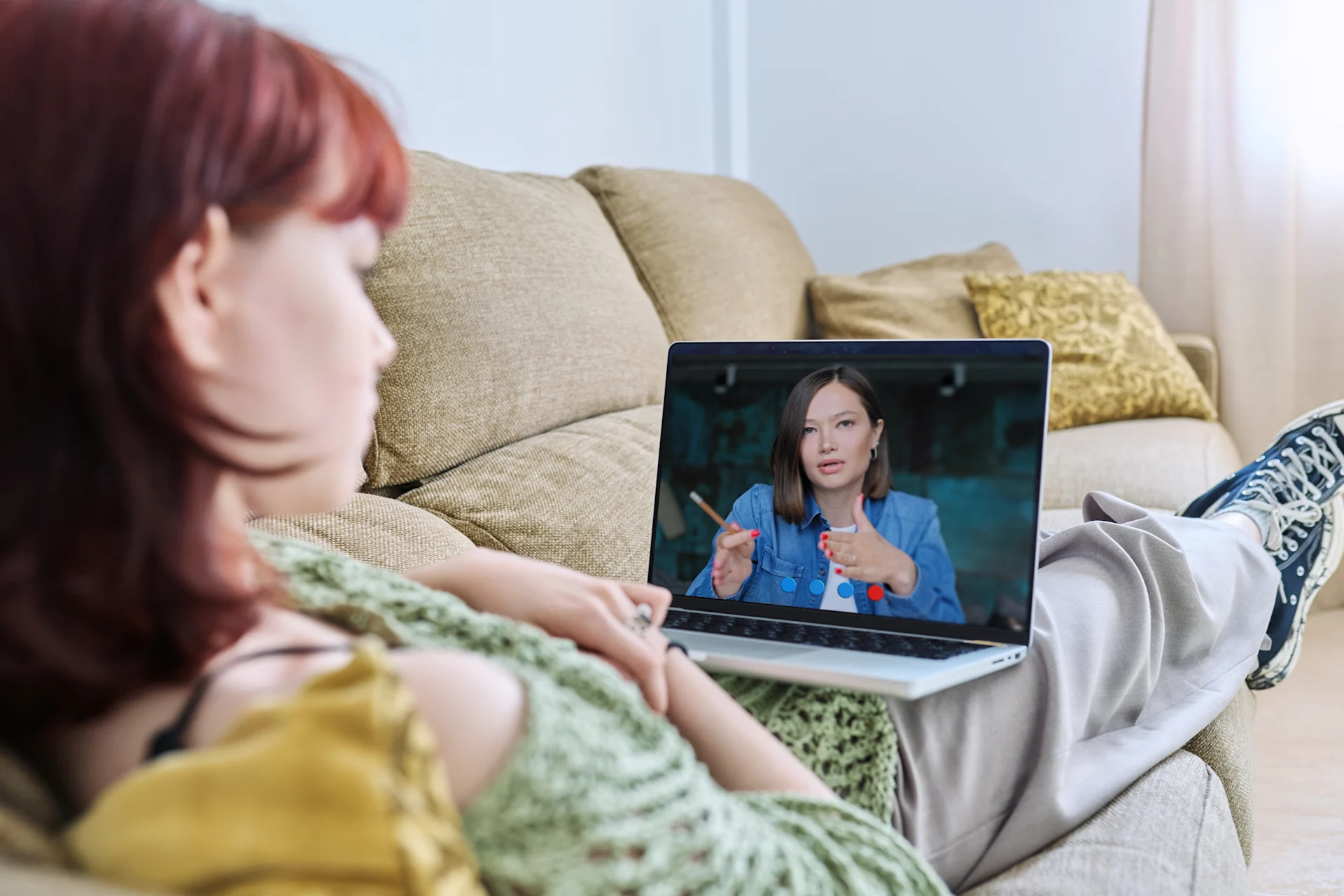Addiction Recovery
Telehealth Addiction Treatment

Telehealth addiction treatment provides flexible, confidential care through digital platforms. Discover how remote therapy supports lasting recovery.
What is telehealth addiction treatment?
Telehealth addiction treatment delivers therapy and support services remotely through secure digital platforms like video conferencing. It offers accessible, flexible care from home, helping individuals receive treatment without the barriers of transportation, scheduling conflicts, or stigma associated with in-person visits.
Is telehealth effective for addiction recovery?
Yes, telehealth has proven effective in treating addiction. It offers comparable outcomes to traditional care while improving access, reducing missed appointments, and ensuring continuous engagement. The flexibility and privacy it provides also encourage sustained participation, essential for long-term recovery success.
Does insurance cover telehealth addiction treatment?
Many insurance providers now cover telehealth addiction treatment, including therapy and consultations. Coverage may vary, so it’s essential to verify the specific benefits of your plan. Confirming eligibility in advance helps avoid unexpected costs and ensures you receive all available telehealth services.
What technology do I need?
To access telehealth services, you will need a smartphone, tablet, or computer with a stable internet connection, as well as a camera and microphone. Using a quiet, private space during sessions enhances communication and allows for a focused, productive therapy experience that supports effective recovery.
Is telehealth therapy private and secure?
Telehealth platforms adhere to strict privacy laws, such as HIPAA. They use encrypted video and secure logins to protect your personal information. These safeguards ensure confidentiality, enabling you to participate in therapy with confidence and without concern for data breaches or unauthorized access.
Accessing addiction treatment has never been easier. Telehealth addiction services offer confidential and effective care right from the comfort of your own home. Whether you're battling substance use or supporting someone who is, telehealth removes barriers like stigma, distance, and scheduling.
With personalized support available at your fingertips, recovery becomes more flexible and accessible. This digital approach empowers individuals to regain control over their lives without having to step away from their daily responsibilities.
At The Edge Treatment Center, we believe in making recovery accessible to everyone through expert care tailored to your unique needs, delivered safely and conveniently through virtual platforms. Your healing journey can begin today, from wherever you are.
Understanding Telehealth Addiction Treatment
Telehealth addiction treatment represents a transformative shift in how individuals access and experience care for substance use disorders. Instead of relying solely on traditional in-person visits, telehealth leverages technology to deliver services such as therapy, consultations, and education remotely.
This method not only addresses logistical challenges but also normalizes treatment by integrating it into everyday life. Platforms such as secure video conferencing, mobile applications, and patient portals serve as the primary conduits for care.
They enable users to connect with qualified professionals, monitor their progress, and access resources without the need to travel. This shift is particularly vital for those living in rural or underserved areas where access to specialized care may be limited.
Key Advantages for Patients: Telehealth addiction treatment offers several clear benefits that significantly improve the overall care experience:
Confidentiality: Sessions are conducted over encrypted, secure networks, ensuring that all communication between the patient and provider remains private. This encourages openness and helps reduce the stigma often associated with seeking help.
Accessibility: One of the most notable advantages is the elimination of geographical and mobility barriers. Individuals who live far from treatment centers or have transportation challenges can still receive consistent care.
Flexibility: Telehealth allows patients to schedule sessions that fit their personal and professional lives. This flexibility reduces missed appointments and supports sustained engagement in the recovery process.
Cost-Effectiveness: By removing the need for travel, lodging, and time off work, telehealth often reduces the financial burden of treatment. This makes it a more feasible option for many.
Continuity of Care: Telehealth fosters uninterrupted support, particularly during transitions such as moving or changing employment. Consistent access to care providers helps maintain momentum in the recovery process.
Digital Tools Enhancing Care Modern telehealth platforms integrate several digital tools that enhance treatment delivery:
Video Conferencing: Enables real-time, face-to-face interactions, which are crucial for building trust and therapeutic rapport.
Mobile Apps: These offer features such as mood tracking, medication reminders, and guided journaling. Some apps even connect patients with support groups and recovery communities.
Patient Portals: Secure websites that enable patients to view their treatment plans, access educational materials, communicate with providers, and schedule appointments. These portals streamline communication and improve care coordination.
Benefits of Telehealth for Addiction Recovery
Accessible and Convenient Care: Telehealth eliminates the need for commuting or arranging transportation, making it easier for individuals to participate in treatment. This convenience is especially beneficial for individuals with disabilities, those with caregiving responsibilities, or those with demanding work schedules. Recovery support becomes a part of daily life, rather than a disruption to it.
Preserving Privacy: Stigma remains a significant barrier to seeking help for addiction. Telehealth allows individuals to receive treatment in the privacy of their own space, away from potentially judgmental environments. Encrypted platforms and private log-ins ensure that all interactions remain confidential, helping patients feel secure and respected.
Tailored Treatment: Telehealth enables a highly personalized approach. Providers can deliver treatment that aligns with each patient's medical history, psychological needs, and lifestyle. Whether through weekly individual sessions, group therapy, or family involvement, the treatment plan evolves as the patient progresses. Digital flexibility enables timely adjustments, keeping care aligned with recovery goals.
How Telehealth Works for Addiction Treatment
Online Sessions and Therapy Patients typically attend sessions using secure video platforms. These can include individual therapy, group therapy, psychiatric evaluations, and educational seminars. The face-to-face nature of video conferencing ensures that the therapeutic relationship remains intense and personal, even when physical presence is absent.
Resources and Tools Available: Treatment is supported by various online tools designed to facilitate progress:
Educational content, including videos and reading materials on addiction, coping strategies, and relapse prevention.
Scheduling systems that automate reminders and allow easy rescheduling.
Progress trackers that help patients visualize their achievements and setbacks.
The Role of Confidentiality in Telehealth Services
Advanced Security Protocols: Maintaining confidentiality is a cornerstone of effective telehealth treatment. Platforms utilize end-to-end encryption, password-protected logins, and automatic logouts to ensure session security. These measures ensure that sensitive conversations and records are shielded from unauthorized access.
Regulatory Standards Telehealth services in the United States are subject to HIPAA (Health Insurance Portability and Accountability Act) regulations. Providers must adhere to strict guidelines on data handling, storage, and sharing. This compliance guarantees that all aspects of care meet legal and ethical standards.
Trust and Engagement. When patients trust that their information is safe, they are more likely to engage openly in therapy. This trust fosters stronger therapeutic alliances, which are critical for successful treatment outcomes. Telehealth's emphasis on privacy and professionalism helps cultivate this trust from the very first session.

We’re Here To Help You Find Your Way
Would you like more information about telehealth? Reach out today.
Types of Therapies Available in Telehealth

Cognitive Behavioral Therapy (CBT) is well-suited to the telehealth format due to its structured and goal-oriented nature. It focuses on identifying and altering harmful thought patterns that lead to substance use. CBT techniques, such as thought journaling and behavioral experiments, can be practiced between sessions and discussed virtually.
Motivational Interviewing (MI) is a client-centered approach that uses empathetic communication to help patients resolve ambivalence about recovery. Through reflective listening and guided questioning, therapists help patients discover internal motivation and commit to change.
Contingency Management (CM) involves rewarding patients for meeting treatment goals, such as attending sessions or passing drug tests. These incentives, even when delivered virtually, can increase motivation and reinforce positive behaviors.
Involving Family Members, Family therapy sessions conducted via telehealth address interpersonal dynamics and create a stronger support system. Family involvement has been shown to improve recovery outcomes by enhancing communication and accountability.
Online peer groups offer a sense of belonging and shared experiences. These sessions foster mutual support, reduce feelings of isolation, and encourage long-term sobriety through community engagement.
Overcoming Challenges in Telehealth Addiction Treatment
Tackling Tech Hurdles: Access to technology is not universal. Some patients may struggle with unstable internet or a lack of devices. Addressing this includes offering tech tutorials, providing loaner devices, or collaborating with community centers to offer access points.
Enhancing Virtual Communication: Virtual settings may limit the use of non-verbal cues. Therapists can overcome this by using visual aids, confirming understanding frequently, and maintaining eye contact through the camera. Explicit and intentional communication enhances the effectiveness of sessions.
Fostering Digital Trust: Developing rapport in a digital setting requires consistency, empathy, and attentiveness. By tailoring sessions to individual preferences and checking in frequently, therapists build strong connections that transcend the virtual barrier.
Telehealth Addiction Treatment with The Edge Treatment Center
Individualized Care Strategies. We believe no two recovery paths are the same. At The Edge Treatment Center, our telehealth programs begin with comprehensive assessments to design customized treatment plans. Each plan evolves with the patient, ensuring care stays relevant and practical.
Removing Barriers to Treatment: Our telehealth services eliminate traditional roadblocks, including commute times, stigma, and schedule conflicts. Patients receive expert care from the comfort of their home, increasing accessibility and consistency.
Holistic Treatment Integration: We integrate mental health therapy, physical wellness support, and skill-building into a single, cohesive plan. This holistic model ensures that patients receive care for every aspect of their well-being, whether via telehealth or in-person when needed.
Commitment to Personalized Recovery
Comprehensive Wellness Focus Our team supports emotional, psychological, and physical healing through multidisciplinary care. Services may include therapy, medical evaluations, nutrition planning, and mindfulness practices.
Tailored Recovery Strategies: Every plan is customized to align with each patient's unique goals, lifestyle, and stage of recovery. This ensures continuous relevance and encourages active participation.
Ongoing Encouragement and Adaptation Recovery is not a linear process. We continually assess progress, celebrate milestones, and pivot strategies as needed. Our team remains engaged every step of the way, helping each other build a sustainable, substance-free life.

We’ll Lead You to New Heights
Do you have more questions about telehealth? Reach out.
Healing Without Boundaries
Recovery shouldn’t be limited by distance, stigma, or schedule. Telehealth addiction treatment offers a bridge to healing—accessible, private, and tailored for your life. Whether starting your journey or continuing it, The Edge Treatment Center delivers support that meets you where you are. With a compassionate team and cutting-edge tools, recovery becomes a reachable goal, not a distant hope.
Contact us now and know that help is always just a call away. Healing is no longer confined to a clinic. It’s a conversation, a session, a connection—delivered right to your screen, and designed to last.

We’re Here To Help You Find Your Way
If you or a loved one is struggling with addiction, there is hope. Our team can guide you on your journey to recovery. Call us today.
Written by
The Edge Treatment Center
Reviewed by
 Jeremy Arzt
Jeremy ArztChief Clinical Officer
Addiction Recovery
July 15, 2025
